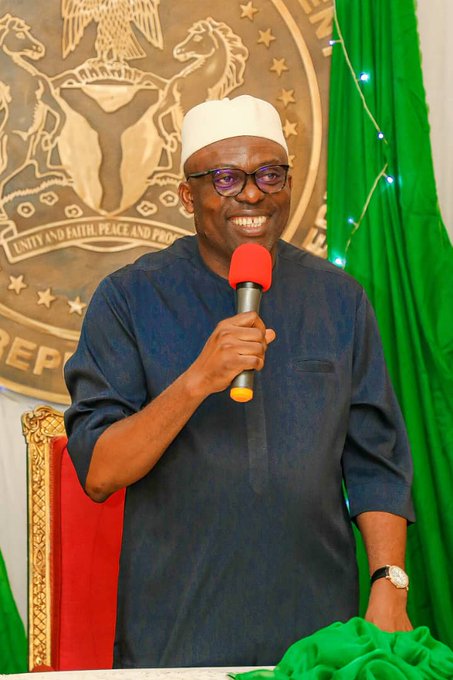Rivers State Governor, Siminalayi Fubara, has shrugged off the recent Supreme Court ruling concerning his decision to withdraw the appeal related to the 2024 state budget. Speaking through a statement from his Commissioner for Information and Communication, Warisenibo Joe Johnson, Fubara made it clear that he was not moved by the court’s judgment, reaffirming his stance that the appeal was no longer relevant.
The statement, released on Monday, stressed that the 2024 budget cycle had ended on December 31, 2024, and as such, the appeal had lost its practical significance. “There is no Supreme Court judgment against Governor Fubara,” the statement declared, categorically rejecting any claims otherwise. Fubara’s decision to withdraw the appeal was framed as a strategic move that reflected sound judgment rather than an attempt to avoid legal scrutiny.
Appeal Withdrawn, No Grounds for Concern
The legal battle surrounding Rivers State’s 2024 budget had garnered attention following Governor Fubara’s withdrawal of the appeal, which had been in contention before the Supreme Court. The appeal, initially filed to contest aspects of the budget, had effectively become obsolete after the budget was fully implemented in late December 2024. With the cycle having come to a close, Governor Fubara saw no reason to pursue the case further.
Fubara’s spokesperson, Warisenibo Joe Johnson, emphasized that the appeal had no further utility. “The only reasonable thing left to do was to withdraw the appeal and have it dismissed,” Johnson stated. He further clarified that there was no substantial legal issue at play—only an administrative decision to end the matter.
In fact, Fubara’s camp has publicly distanced itself from any claims suggesting the Supreme Court had made a ruling detrimental to the governor’s position. The statement went on to challenge political opponents, calling the controversy surrounding the appeal “outdated political propaganda” fueled by “desperate politicians.”
“The appeal has been withdrawn,” the statement concluded. “The matter is closed.”
The Importance of Legal Efficiency and Avoiding Unnecessary Burdens
In his remarks, Governor Fubara also pointed to the overall burden that unnecessary cases can place on the country’s highest court. While addressing the political implications, Fubara was keen to stress that the Supreme Court is a critical institution already dealing with pressing national matters.
“It would be unwise to burden the Honourable Court with academic appeals that hold no practical or utilitarian value,” said Johnson, in an apparent reference to critics who have seized on the issue for political gain. “The urchins are celebrating over a case that has no bearing on the actual affairs of Rivers State.”
In a country where judicial processes are often delayed by overcrowded case dockets, Fubara’s remarks resonate with those advocating for efficiency in the legal system. Critics have long called for the reduction of time spent on cases that are seen as politically motivated or lacking substantive legal merit.
The Politics Behind the Appeal and Its Withdrawal
The controversy over the 2024 Rivers State budget appeal is rooted in the broader political landscape of Nigeria, where budget allocations and government spending are frequent points of contention. Fubara’s opponents, particularly those within the political opposition, had seized on the appeal as an opportunity to undermine the governor’s administration.
However, Fubara’s decision to voluntarily withdraw the appeal appears to be a calculated move aimed at removing any lingering political friction while avoiding further legal entanglements. This tactic may also allow the governor to focus on the implementation of his policies without being bogged down by prolonged legal disputes.
Political analysts have observed that the timing of the appeal’s withdrawal was significant. It occurred after the conclusion of the 2024 budget cycle, which suggests that Fubara’s administration had already completed the key phases of budget implementation. With the matter now behind him, Fubara can confidently shift focus toward advancing the state’s developmental agenda.
Meanwhile, sources close to Nyesom Wike, the current Federal Capital Territory (FCT) Minister and former Rivers State Governor, have remained tight-lipped about the matter, choosing not to comment on the governor’s decision. Wike, who has been an influential figure in Rivers politics, is known to have a complicated relationship with Fubara, making his silence all the more intriguing. Some political observers have suggested that Wike’s refusal to address the matter publicly could be an attempt to avoid further polarization or to distance himself from a situation that may no longer be relevant.
The Broader Implications for Rivers State
Fubara’s decision to withdraw the appeal can also be viewed in the context of his broader political strategy in Rivers State. Having assumed office as governor in May 2023, Fubara has been navigating the tricky terrain of state governance amidst a backdrop of high expectations and a politically charged environment.
His focus on the budget, which had been at the heart of the controversy, is a clear indication of his administration’s commitment to transparency and efficient governance. The 2024 budget itself had been widely regarded as a key instrument for delivering the governor’s policy goals, particularly in infrastructure development and economic growth.
By withdrawing the appeal, Fubara effectively closed the door on any further distractions surrounding the 2024 budget, allowing his administration to shift its full attention toward governance. As the state moves forward into 2025, it is expected that the governor’s policy priorities will center on improving public services, enhancing the state’s economic development, and fostering greater political stability. For now, the governor’s calm response to the Supreme Court’s ruling has allowed him to present himself as a leader who is unshaken by political noise an

